36 Questions Consultants Should Ask Their Prospects & Clients
Mar 28, 2023
Estimated time to read: 18 minutes
Download the article as a PDF:
Table of contents
- Introduction
- The importance of effective client communication for independent consultants
- Top questions consultants should ask their consulting clients
- Questions to ask when networking, to uncover potential opportunities
- Questions to ask potential consulting clients in your first meeting
- Questions to ask potential consulting clients during discovery meetings
- Questions to ask clients during proposal review meetings
- Questions to ask clients during the consulting engagement
- Questions to ask clients during client interviews for testimonials
- Taking your independent consulting business to the next level
Introduction
As a former independent consultant myself, I know firsthand the challenges that come with navigating the sales process and how to get all the information you need to make a well-thought-out and compelling proposal. That's why in this article, we'll be discussing the essential questions that consultants should be asking their potential clients to help you move the sales process forward to an eventual contract.
As an independent consultant, you may feel like you're navigating client relationships on your own, without the support of a marketing and sales team. You may be unsure about what questions to ask as you’re selling your services, to fully understand your potential client's needs.
In this article, we'll explore some of the strategies that have worked best for me and for my independent consultant clients, so you have confidence you’re asking the right questions throughout the sales cycle.
I developed these strategies and tactics over more than a decade of experience as a successful independent consultant and I'm confident that the insights and advice in this article will help you build stronger, more successful relationships with your potential clients and ultimately help you convert more conversations into closed consulting contracts.
In this article, I share the 36 questions to implement in your consulting practice to elicit and add value for your clients, and for you.
The importance of effective client communication for independent consultants
Independent consultants make three main mistakes as they’re engaging with their clients and potential clients. These three mistakes are
- Talking too much and not listening enough
- Treating the business development process like an interview for a full-time role instead of a peer-to-peer conversation and
- Constantly trying to explain and prove themselves instead of being curious and in investigative mode to clearly understand the problem, human dynamics, and goals
When independent consultants make one or more of these mistakes, the impacts can range from eroding trust all the way to losing potential clients.
To avoid making these mistakes, shift your focus to asking better, more probing questions and giving space for the person to answer. Here are the specific ways to do that:
- Set an 80/20 goal for your conversations. Listen 80% of the time and talk 20% of the time. When you do this, you’ll be shocked at how much easier it is to develop a deeper, faster relationship with people, to uncover potential opportunities, and to advance the relationship beyond the initial conversation.
- Be okay with silence. Ask a question and then pause until the other person responds, even if it’s uncomfortable.
- Be genuinely curious. Think about the other person and not yourself to create an all-too-important connection and trust.
- Focus on the relationship, not the transaction. When you’re focused on driving a specific outcome, you come across as transactional and in it for yourself. This impairs the relationship and often shuts down opportunities.
- Notice when you’re trying to prove your intelligence and stop. You won’t land deals by being the smartest person in the room. You’ll land deals and provide the most value to your clients by being a phenomenal question-asker and listener.
- Don’t worry about putting the other person on the spot. Oftentimes, we avoid asking deeper questions because we’re worried we’ll offend or embarrass the other person. For example, if you think that the person you’re talking to won’t know the answer, you might avoid asking them because you don’t want to embarrass them. Avoid falling into this common trap. Think about it from another perspective. One of your values as a consultant is asking great questions and helping your clients to see their problems from angles they haven’t yet considered.
- Don’t shut yourself down by thinking the answer is obvious. Oftentimes, we gain the most insight and valuable information by asking the most basic questions.
- Approach the questions you ask by thinking about how valuable they are for the other person. The point of you asking questions isn’t for YOU to get what you need out of it. The point of asking questions is for you to help your potential clients dive deeper into their goals and challenges, to uncover blindspots, and for them to experience what it’s like working with you as a thought partner and trusted advisor.
In this article, I share the specific, open-ended questions independent consultants can ask in order to build trust, gain a deeper understanding of the client’s motivations, and demonstrate expertise without monologuing.
Your resource to put the article into action:
Download the 50 Questions to Ask Your Prospects and Clients, including the 36 questions in this article and 14 bonus questions.
Top questions consultants should ask their consulting clients
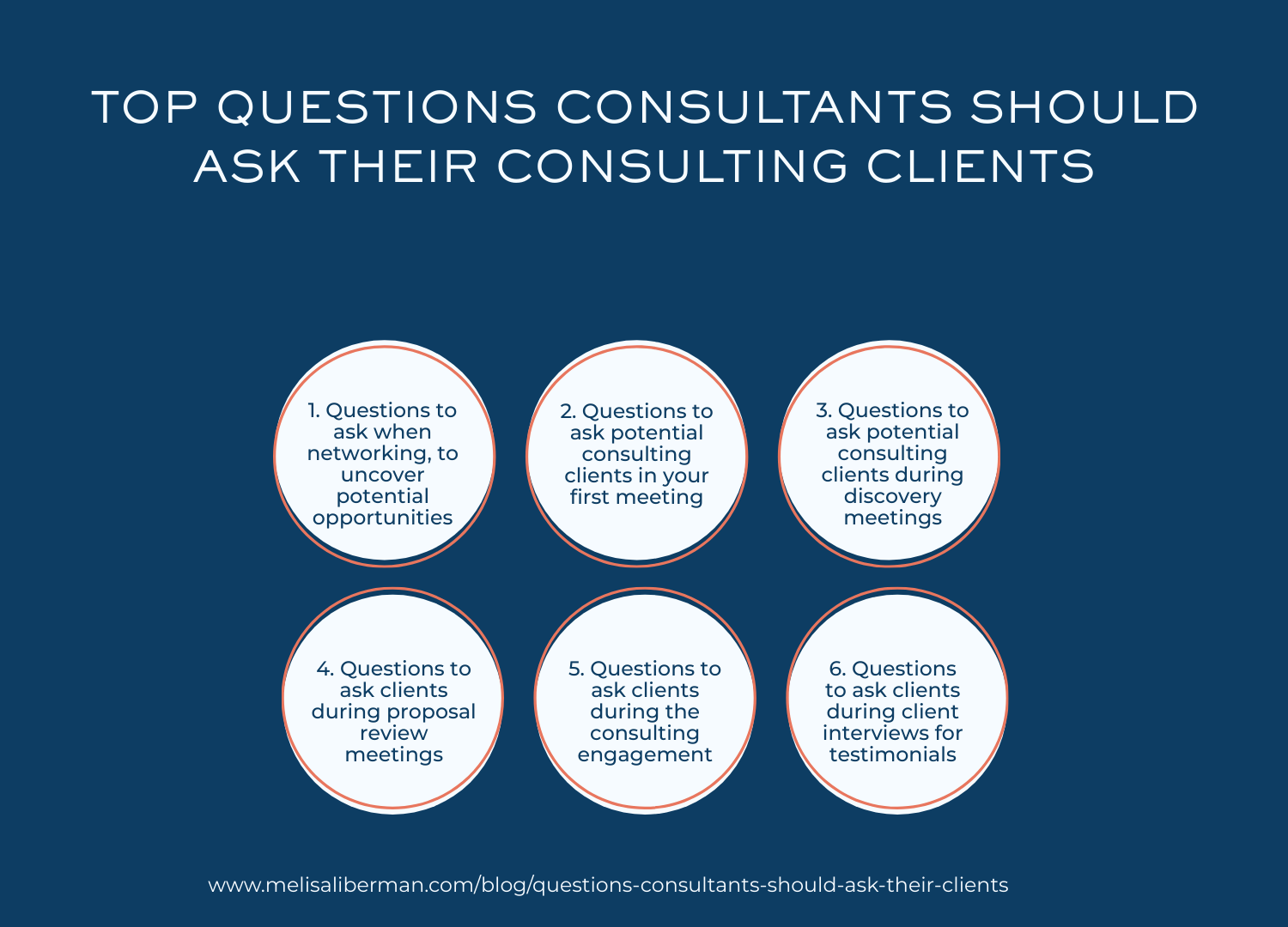
1. Questions to ask when networking, to uncover potential opportunities
It’s crucial for independent consultants to develop the skill of uncovering potential opportunities with the people they meet, at conferences, at events, and with potential collaborators or referrers.
When you’re able to ask powerful questions from a place of genuine curiosity, you’ll be able to generate more follow-on conversations and opportunities than you ever thought possible.
Question 1: Ask "Why?"
The simple question of why is almost always overlooked. We are socialized not to pry. And, we also don’t want to come across as stupid. So, we avoid asking the important follow-on questions, the questions that help us understand the person we’re talking to more deeply and what drives them. Ask why more often so you can uncover your potential client’s motivations and values.
Asking “Why” is also a great question because it’s easy to remember. I frequently remind my coaching clients to remember to ask why. It’s an easy question to have as a backup and to ask, even if you’re feeling a bit awkward or panicky in a conversation.
Question 2: What things do you wish you could do less of?
Ask an open-ended question to get them talking about what changes they’d love to make for themselves personally and professionally. You can follow up with why, to continue digging deeper into what they’re thinking about, focused on, and what is top of mind for them right now.
Question 3: Is there a particular challenge that excites you?
Asking them about a challenge that excites them will get them talking more aspirationally. You’ll uncover more about what lights them up and what they’re passionate about. This can lead to a great connection when you are able to find similarities between what someone wants to accomplish and solutions you can offer, whether it be your consulting or other resources (introductions, a great book, etc.).
Question 4: I might be able to help. How does your schedule look next week for another conversation?
Make an offer to continue the conversation. In that conversation, you might end up recommending a range of help for the person you’re talking to, everything from working directly with you to a great book that could help them. Don’t get tied down to the outcome you want. Keep it open-ended and curious as you’re beginning the conversations.
For more on Converting Conversations Into Consulting Opportunities, listen to Episode 089 of the Grow Your Independent Consulting Business podcast.
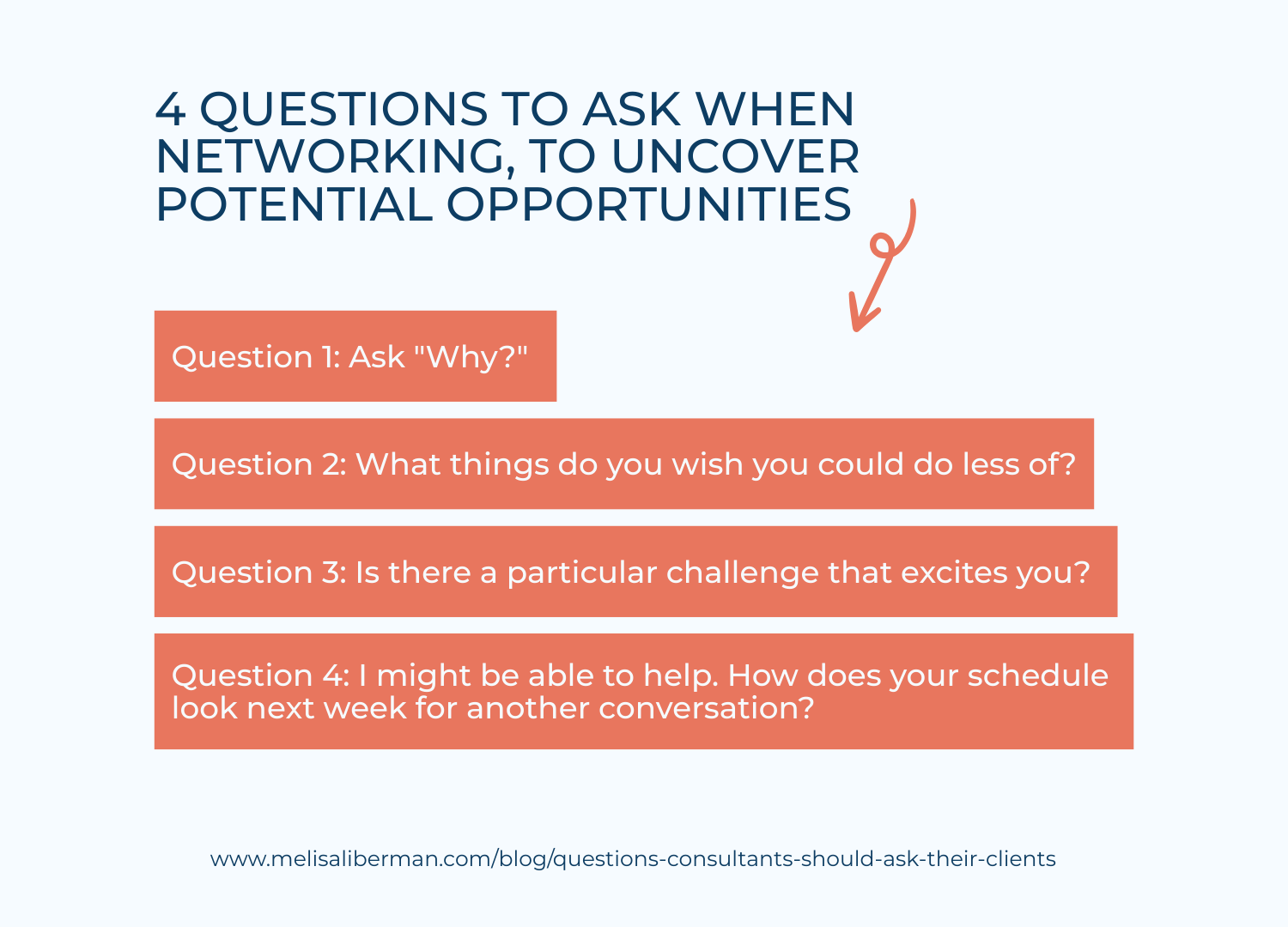
2. Questions to ask potential consulting clients in your first meeting
It’s common for independent consultants to question how to handle a first meeting with a potential client. And then, from a place of doubt and uncertainty, they let nerves take over and end up treating the conversation more like an interview than a meeting with a peer and someone who they could serve as a trusted advisor.
When you don’t make the most of a first meeting with a potential client, you end up leaving a lot of opportunity (and money) on the table. To avoid that common mistake, focus on asking more probing questions.
Here are 7 of the top questions to ask in your first meeting with a potential consulting client:
Question 1: What’s the main reason you wanted to meet with me?
This is a great question to start off with because the answer will almost always give you insight into what the other person values and their intentions for the meeting. This will help you to align your questions and the flow of the meeting to what they care about most.
Question 2: What are you most concerned about?
By asking them about their top concern, you will gain a view into what they’re worried about and what keeps them up at night. And, you can avoid directly asking “what keeps you up at night” which can come across as cliche.
Question 3: What would make the biggest impact for you?
This question will help you gain a deeper understanding of their aspirations and goals. It gives you a direction on what they want the “end state” or outcomes to be for them. This question will also help you better pinpoint their priorities and what matters so that you can hone in on that as the centerpiece of your recommendations and proposal.
Question 4: What has been stopping you from doing this?
The answer to this question will help you uncover their blockers and challenges. Then, you’ll want to make sure you address each of them in your subsequent calls and ultimately your proposed solution.
Question 5: How is this impacting you personally?
Consultants are often hesitant to delve into their client’s personal life, beyond the customary pleasantries. We’re worried about making the other person uncomfortable or about being too intrusive. When you ask for them to share more about their personal goals, ambitions, and challenges you can develop a deeper relationship with the other person and it invites them to co-develop a solution with you, one that meets both their personal and organizational needs.
Question 6: You've mentioned several issues. What's the most important one you are struggling with?
The answer to this question will help you pinpoint their priorities. This question is especially helpful in those conversations where the other person throws the kitchen sink at you and you’re not sure how to sort through it all to develop a solid recommendation.
Question 7: Let’s schedule the next step while we’re here together. How does XYX DATE look for you?
This question has two purposes. The first purpose is to nail down the next step so you’re never left questioning what you should do next to keep this conversation going. The other purpose of the question is to further qualify the potential client. If they agree to set a date/time for the next meeting, it’s more likely they’re interested in your services. If they’re reluctant or refuse to set another meeting, then you’ll want to ask why.
For more on a Game Plan for the 1st Call With a Prospect, listen to Episode 08 of the Grow Your Independent Consulting Business podcast.
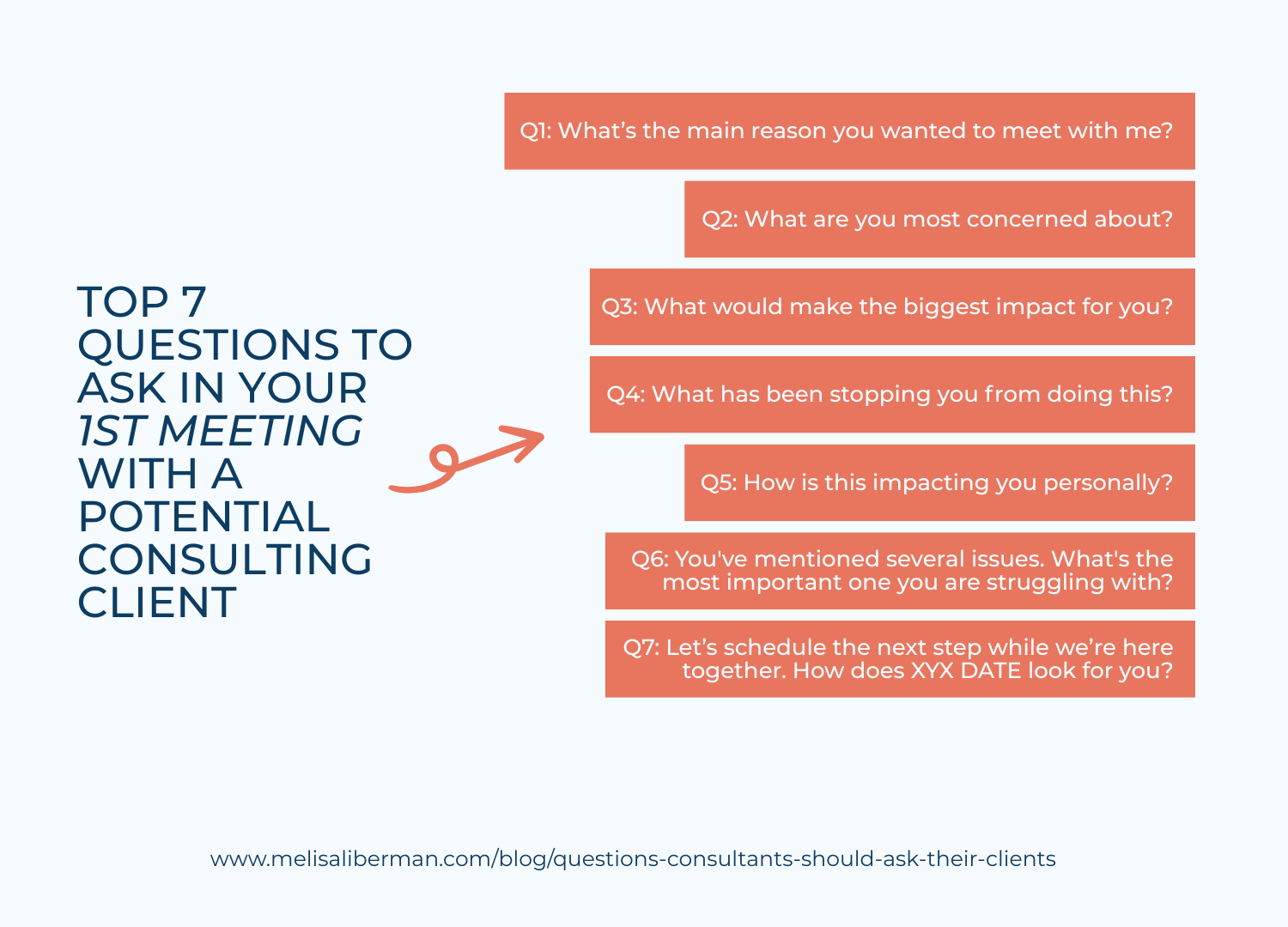
3. Questions to ask potential consulting clients during discovery meetings
After you’ve identified a potential consulting opportunity and agreed with the prospective client that a discovery meeting is the next, best step, you’ll want to prepare questions that elicit what they want to achieve, why they want to achieve it, their concerns and reservations about pursuing the work, the benefits (both quantitative and qualitative) of the potential engagement, and the cost of not doing the engagement.
The insights and information you gain from these questions will be invaluable as you develop a proposed strategy, approach, pricing, and value proposition for the work you’ll be doing.
Question 1: What is the main reason you wanted to meet with me?
Ask an open-ended question to kick off the conversation. Don’t fall into the trap of thinking you should already know the reason that the person is meeting with you. This question will help them open up from the beginning of the meeting.
Question 2: Why do you want to do that?
After they describe what they want, you’ll want to better understand why and their motivations. This question will help you start to uncover their drivers and how they assign value.
Question 3: What have you tried?
Ask them what they’ve tried in the past so you can get a better understanding of what’s worked, what hasn’t worked, and why. A great follow-up question to “What have you tried” is to ask “Why do you think that didn’t work the way you wanted it to?”
Question 4: What has stopped you from doing that? Why do you think that is happening? What do you see as the greatest challenge, barrier, or difficulty?
Ask open-ended questions to understand what blocks, challenges, and difficulties they’ve experienced and anticipate experiencing with respect to the work you’re recommending. This will help you craft a more comprehensive proposal and demonstrate that you’re someone who can help them navigate the internal and external challenges they face.
Question 5: What do you think your options are?
When they answer your question about “what do you think your options are”, you’ll gain insight into what they see as the viable and non-viable solutions to achieve their intended outcome.
Question 6: What is that costing you? What will that cost you? What will not fixing it cost you?
By asking “What is that costing you, or what will it cost you”, you will be able to uncover their perceived costs, including hard costs, opportunity costs, and intangible costs. This information will help you to estimate the overall value as you price out the consulting engagement.
Question 7: If you had no constraints, what would you do?
Ask them about the big picture. This question will help you uncover their aspirations. It will also help you understand their perceived blockers from a different perspective. Most corporate clients rarely have an opportunity to think about the big picture in a mental space that’s free of the constraints they’re constantly battling. You’re giving them value just by asking this question and freeing their mind to think about their goals in this way.
Question 8: Let's say we've completed this effort, what will be different?
The answer to this question will help you to uncover what they value, their priorities, and the drivers behind the potential engagement you’re discussing with them. This information will help you to build out a proposed solution that’s on target with what they care about and is priced out based on what’s valuable to them. Good follow-on questions to this question are: why will that matter? How will that impact the organization?
Question 9: How will you measure the success of this initiative?
The answers to this question will arm you with the data points, both qualitative and quantitative, that you need to price out the services you’ll offer. It will also help you to uncover any gaps in their thinking, so you can recommend additional ways to think about return on investment.
Question 10: What matters most to make a solid business case?
The answers to this question will give you additional insight into why the project you’re discussing is valuable to the organization. It will also help you understand the internal considerations and politics. The business case is important to understand even if the person you’re talking to has ultimate approval.
Question 11: Tell me more.
Tell me more is a great question to ask when you’re not clear on what the other person is asking for or the reason behind what they’re saying. You can pull out more information and insights by keeping the questions simple and open-ended.
Question 12: Who will be involved in the decision to proceed with this project? What do you anticipate their feedback to be?
Independent consultants often shy away from asking questions about the process for their contract, either because they’re worried about what the answer will be or they don’t want to come across as sales-y. The most effective way to ask questions about the potential client’s decision-making process is to think about it from the vantage point of your potential client. Asking them about the process often spurs them to think about the specific steps and buy-in they’ll need to get to move this initiative forward. By asking this question early in the process, it helps you both uncover unknowns and the likelihood of the project moving forward successfully. In short, make this about them and not about what you need.
Question 13: Is the budget approved? If not, what will the approval process look like?
This is another question that most independent consultants avoid. As a business owner, it’s important for you to understand and qualify your potential clients. And, as a consultant and trusted advisor, it’s helpful to your potential client to have an open, transparent, and trusting relationship with their consultant. Think about this question from your potential client’s perspective and set the tone in a way that this question is about making the process successful and NOT about you making sure the client can pay you.
Question 14: We've got a few minutes left. Is there anything we haven't covered that we ought to discuss today?
This is a great way to start wrapping up the discovery process. It is another open-ended question intended to give the potential client the space to share more with you.
Question 15: What would you need to see from me to confirm this effort and get started?
This is another question that will help you understand the internal process for getting buy-in and approval for the initiative. It will also help you clearly understand what the other person wants to see that would be most valuable to them.
Question 16: Let’s schedule the next step while we’re here together. How does DATE sound?
This question has two purposes. The first purpose is to nail down the next step so you’re never left questioning what you should do next to keep this process moving forward. The other purpose of the question is to further qualify the potential client. If they agree to set a date/time for the next meeting, it’s more likely they’re interested in your services. If they’re reluctant or refuse to set another meeting, then you’ll want to ask why.
For more on Selling Consulting Services and Sales Mindset, listen to Episode 100 of the Grow Your Independent Consulting Business podcast.
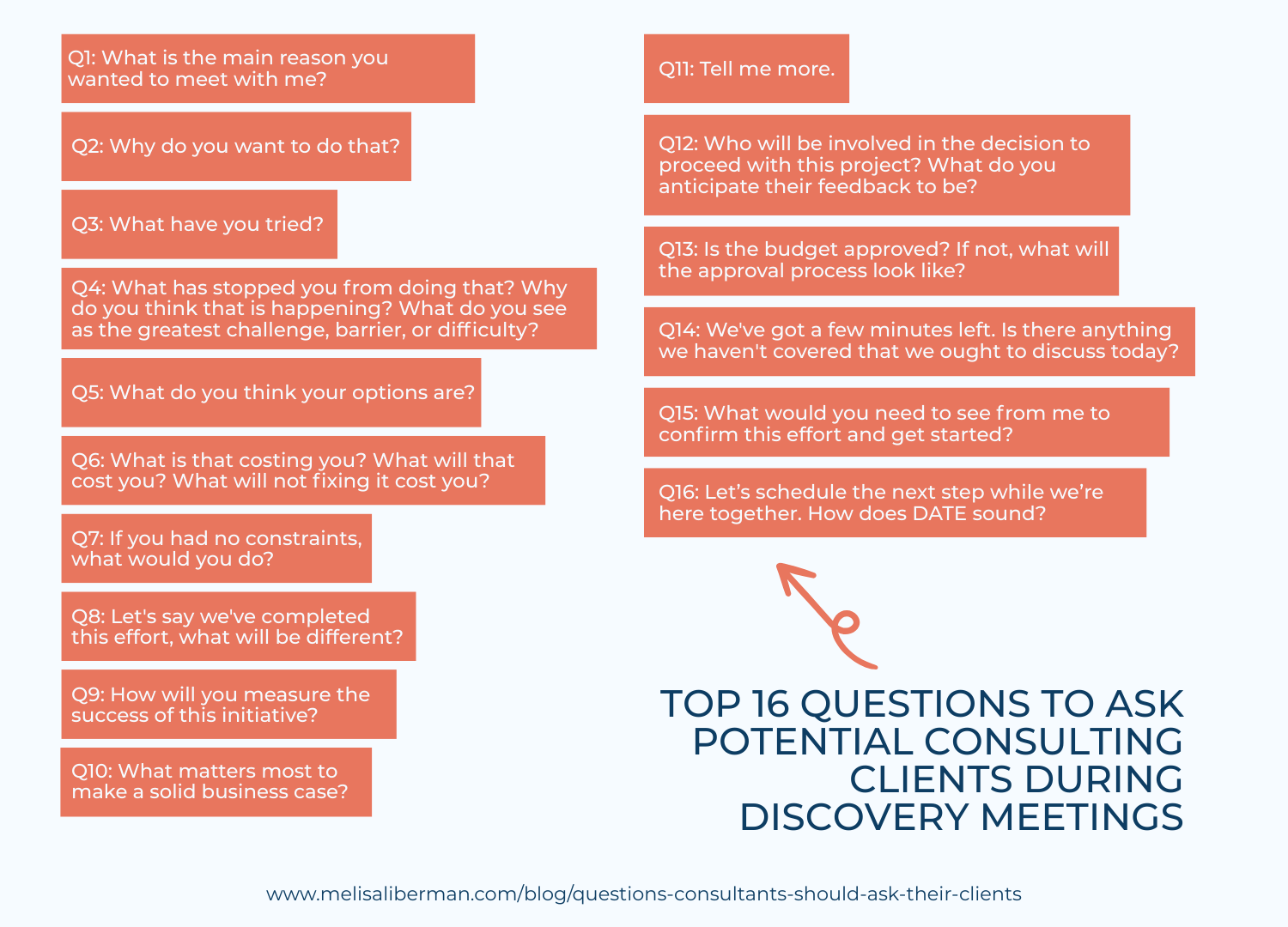
4. Questions to ask clients during proposal review meetings
When you’re at the proposal stage of a consulting sales process, it means that you clearly understand the potential client’s goals and expected outcomes. You understand what they value and what doesn’t matter to them. It means you’ve asked the questions to develop a set of recommendations and a proposed solution that they’ve bought into each step of the way.
If you’ve been asking all the probing questions up to this point, the proposal process should be much easier, and more of a formality.
You’ll want to continue by asking open-ended questions that gauge what the potential client is thinking and uncover any surprises or late-breaking concerns.
Question 1: What are your thoughts?
After you’ve confirmed the client has reviewed your proposal, start by asking “What are your thoughts?”. This is an open-ended question intended to get them talking. To maximize the effect of this question, you’ll want to give them space to answer and be comfortable even if they don’t have an answer right away.
Question 2: Is there any reason you wouldn’t want to move forward?
It’s common for independent consultants to rush through a proposal review in the hopes no issues will be raised. At this stage, you’re likely ready to dive into the work and don’t want to be stuck dealing with the proposal. From that frame of mind, it’s common to avoid asking any questions that would open the door to concerns. But, if there are concerns, they won’t be solved by you avoiding them. Hit this head-on and ask if there’s any reason the potential client wouldn’t want to move forward. Ask the question and then don’t say anything. Give them the space to anticipate any issues and communicate them to you. Again, make this about that potential client and them getting the outcomes they want, and not about you and what you want.
Question 3: What’s the immediate next step to get this executed? Let’s schedule a quick, check-in (or kick-off call) while we’re here together. How does XYZ date look?
I’ll repeat this over and over. One of the biggest mistakes independent consultants make is leaving a meeting without a clearly defined, scheduled next step. Don’t make that mistake. Make it a habit to always schedule a next step, even if it means you can only get the potential client to set a date for a date.
For more on Overcoming Consulting Proposal Procrastination, listen to Episode 103 of the Grow Your Independent Consulting Business podcast.
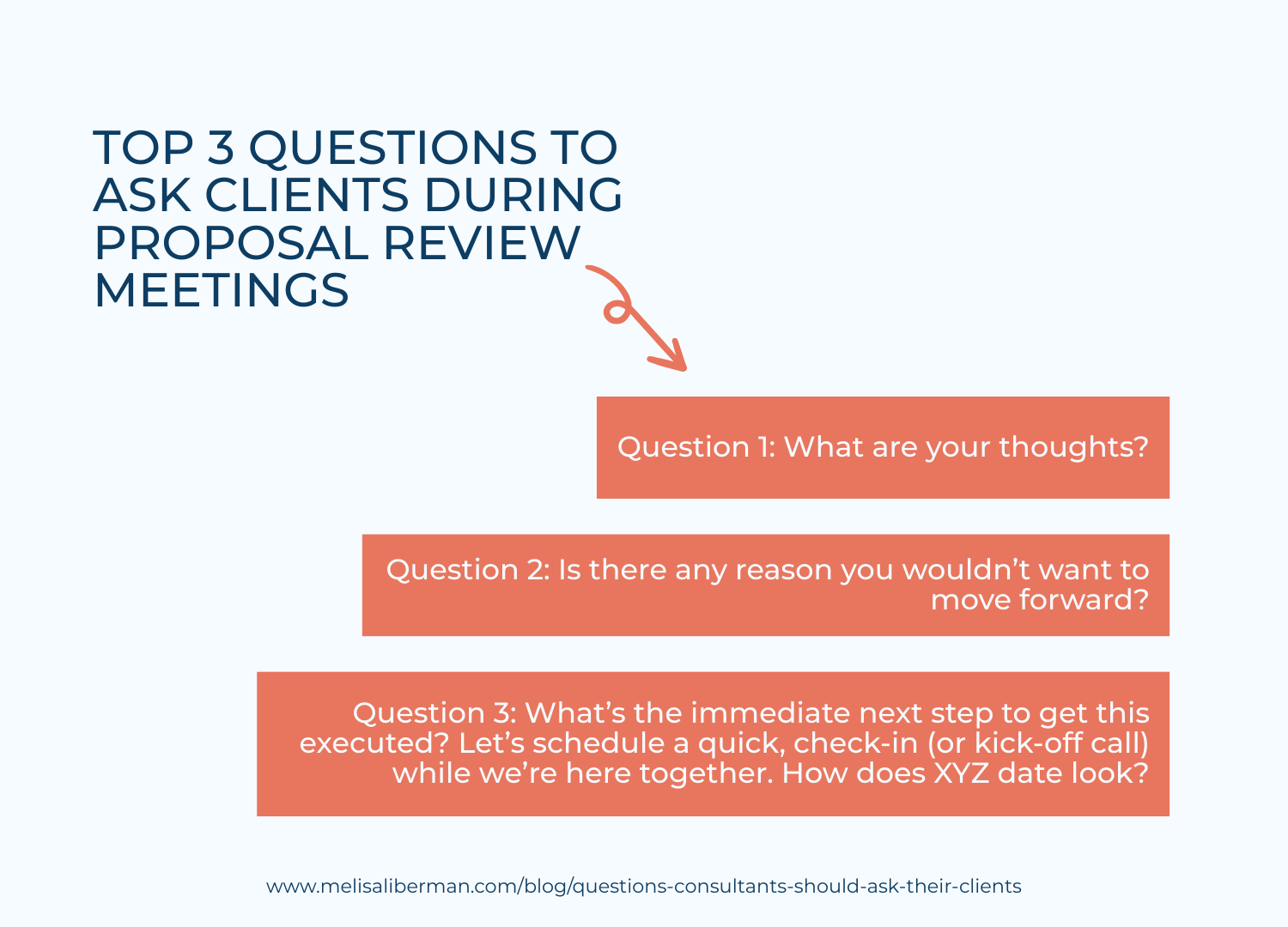
5. Questions to ask clients during the consulting engagement
As you deliver consulting services for your clients, it’s vital to continue asking open-ended questions so you can gather information required for the success of your project and also intel that can help you determine the path for follow-on work.
Here are three questions to ask frequently during the course of your engagements.
Question 1: "Why?"
During the course of your engagement, you’ll get pushback, change in direction, clients who don’t hold up their responsibilities, and team members who aren’t on board with the initiative. Your go-to question will be - why? One of my clients calls it his “Sherlock Holmes” mode. Go into your own Sherlock Holmes mode to figure out the underlying drivers behind what is happening on your project, so you can understand the motivations and find ways to continue progress to the final outcome.
Question 2: Tell me more
Similar to asking “why” as often as you can, even when it doesn’t feel comfortable, you can say “Tell me more.” While it’s not technically a question, it’s close enough….
You’ll say tell me more and then stop. Don’t say anything else. Wait until the client responds. You can use “tell me more” as a way to dig under the covers and find the real reasons behind the challenges you’re facing on the engagement and also find ways to amplify what’s going well.
Question 3: Can we step back from this? What should we be talking about?
“Can we take a step back?” is a great question to ask when you notice misalignment, frustration, pushback, or disengagement. This tool is helpful for resetting a conversation with a client and zooming out for people in the conversation to look at the bigger picture.
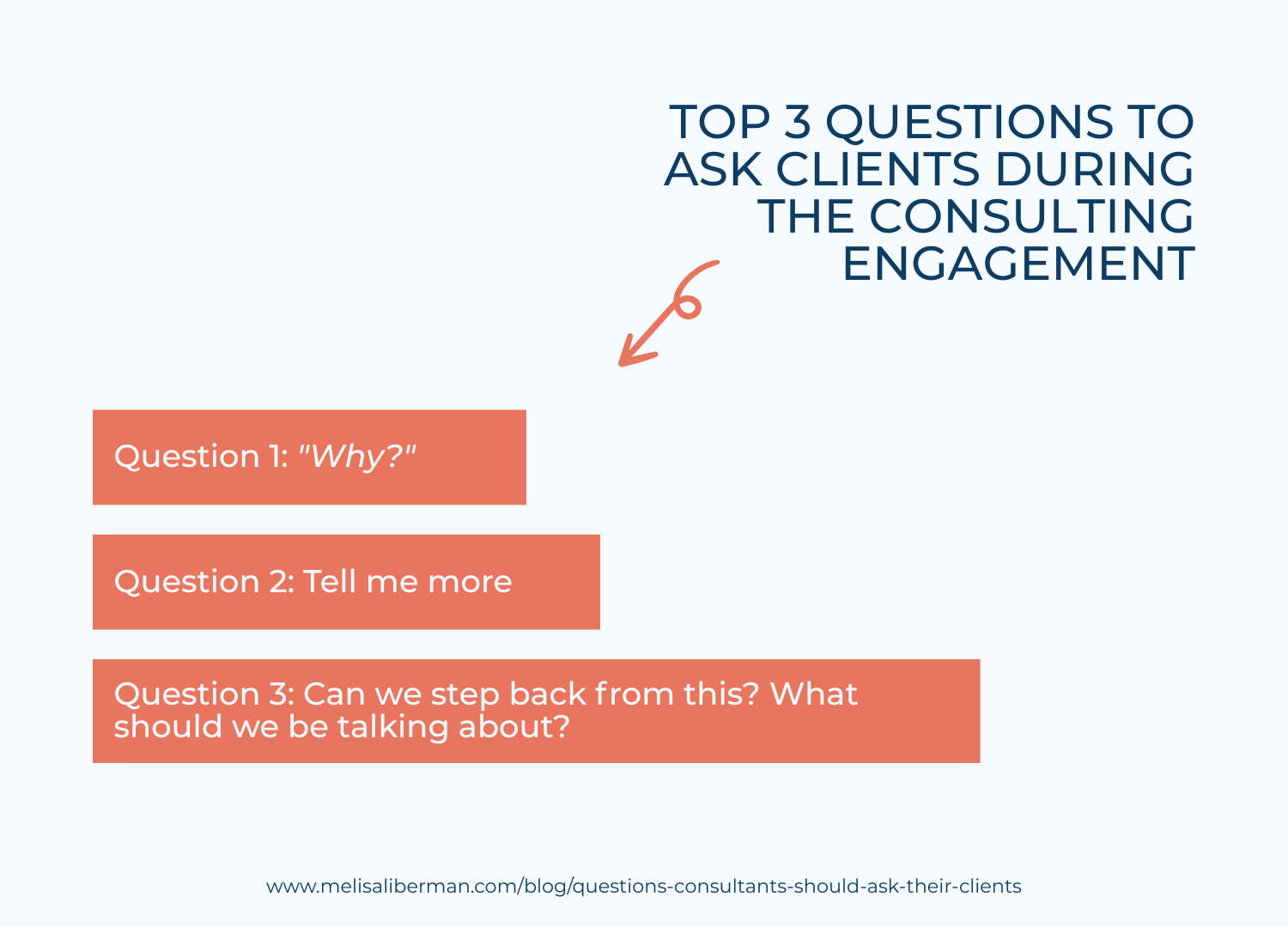
6. Questions to ask clients during client interviews for testimonials
Don’t overlook the importance of capturing testimonials as part of your engagement close-down process. Having a standard set of questions that you can send to the client ahead of time, and that are simple for them to answer without a lot of work on their part will reduce the barriers to getting a solid testimonial every time.
Here are 3 simple questions to ask for each of your client testimonials.
Not only are these great questions to ask for your marketing and sales materials, but they’re also questions you’ll want to know the answers to so that you’re able to get into the mind of your best clients and use this information to inform the future questions you ask during your consulting sales and delivery processes.
Question 1: How would you describe the challenge or goal you had before we started this project?
Ask the client to explain the challenges and goals they faced before working with you. This is valuable to hear in their own words about what they faced and why they decided to engage you.
Question 2: How would you describe and quantify the results of the work we’ve done?
Ask the client to describe and quantify the results of the work you did with them. Their answers to this question will help you in sales and marketing your services in the future and will also help you to better understand the way clients think about the value and benefits of the work you do. This information is particularly important for pricing.
Question 3: What was your experience like working with me?
Ask the client to describe their experience working with you. This question helps you to capture your intangible qualities and differentiators.
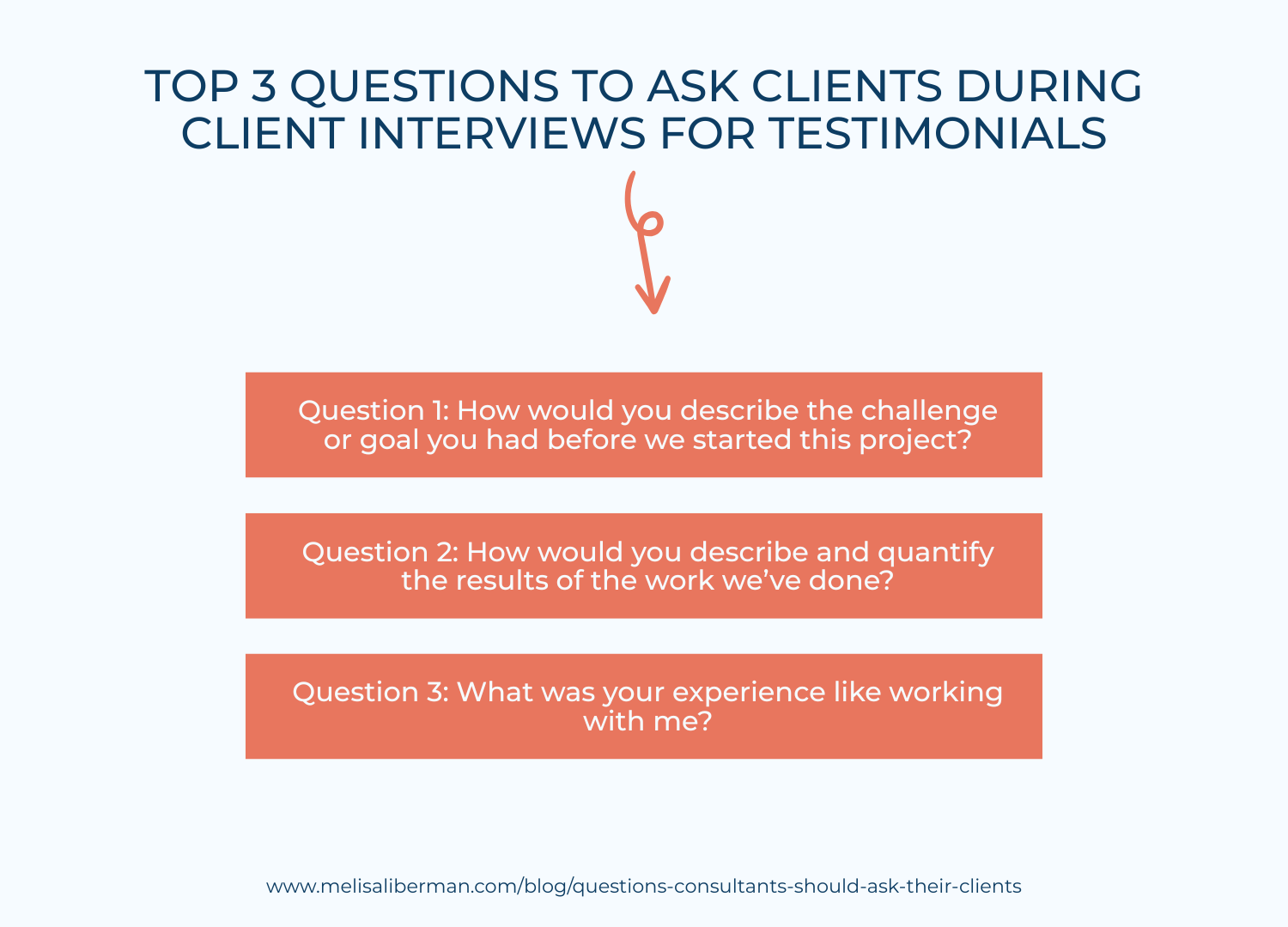
Taking your independent consulting business to the next level
To put this article into action in your business, I recommend three next steps.
1. Download the 50 Questions to Ask Your Prospects and Clients PDF. I created a simple PDF with 50 questions you can ask your prospects and clients. It contains the 36 questions in this article and 14 additional questions in a simple, cheatsheet for you.
2. Then, take the questions from this article and map out your end-to-end business development process so you know exactly what questions you’ll ask in your networking, and at each stage of your sales process in order to qualify ideal clients and gain all the knowledge you need to build out a meaningful, value-filled proposal.
3. And then, consider private coaching to help you see your blind spots and reach your business goals with more certainty and ease. Click here for details on private coaching and to reach out for a consultation to determine if it’s the best fit for you and your business.







